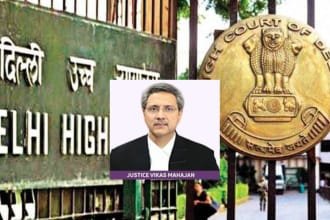In a landmark environmental accountability ruling, the Supreme Court of India has issued contempt notices to the Chief Secretaries of Delhi, Uttar Pradesh, Haryana, and Rajasthan over their failure to comply with a court directive to fill vacancies in their respective Pollution Control Boards (PCBs) and Pollution Control Committees. The states had been ordered to complete this recruitment process by April 30, 2025, a directive that now stands wilfully violated according to the apex court.
Background of the Case: MC Mehta v. Union of India
The matter arises from the long-standing environmental litigation MC Mehta v. Union of India [WP (C) No. 13029/1985], which deals with air pollution and environmental governance in the National Capital Region (NCR). In a previous order dated August 27, 2024, the Supreme Court had mandated that all sanctioned posts in PCBs of NCR states be filled by April 30, 2025. This was aimed at strengthening the enforcement of environmental laws under the Environment Protection Act, 1986, Air Act, and Water Act.
Contempt Action for Wilful Disobedience
On May 9, 2025, a bench comprising Justice Abhay S. Oka and Justice Ujjal Bhuyan observed a “wilful breach” of the Court’s previous directive. Consequently, the Court issued contempt notices to the Chief Secretaries of Delhi, UP, Haryana, and Rajasthan, asking them to show cause as to why action under the Contempt of Courts Act, 1971 should not be initiated against them.
Of these, the Chief Secretary of Delhi has been directed to appear physically before the Court on May 19, 2025, with the bench rejecting a plea for virtual appearance. Noting Delhi’s repeated non-compliance, the bench remarked in frustration, “We will have to request the Registry to provide a room for the Chief Secretary in the Court, if this kind of lacklustre attitude continues.”
Disturbing Vacancies Undermining Pollution Control Efforts
The Court took note of alarming vacancies in key pollution regulatory bodies:
- Delhi: 55% posts in the Pollution Control Committee remain vacant, rendering it “virtually defunct.”
- Haryana: 35% vacancies, with the government citing unavailability of suitable candidates.
- Rajasthan: 45% vacancies, although the state has initiated the process to fill 164 posts.
- Uttar Pradesh: Also reports 45% vacancies.
The Court expressed deep concern over Delhi’s non-functional status despite repeated judicial interventions and escalating air pollution crises. “We are shocked to know that the Delhi Pollution Control Committee is virtually defunct… For several years, Delhi is facing huge problems of air pollution,” the Court observed.
Judicial Directions and Future Timeline
The bench has set stringent deadlines and warned that non-compliance by the returnable dates (May 19 for Delhi and July 18 for others) will constitute “aggravated contempt.” In addition:
- All vacancies in the Central Pollution Control Board (CPCB) must be filled by *August 31, 2025, with a compliance affidavit to be filed by the *Union of India.
- All state PCBs and Pollution Control Committees (including UTs) must complete staffing by September 30, 2025.
- Commission for Air Quality Management (CAQM) has been tasked to undertake a systematic study of the functioning, technology, and equipment of state PCBs, with a report due by the end of July 2025.
Vacancy Crisis Across India
The Court was informed that the vacancy issue is not limited to NCR states:
- CPCB: 21% posts vacant.
- CAQM: 37 out of 56 posts vacant.
- Bihar: 90% of PCB posts are unfilled.
- Many other states and Union Territories like Chandigarh, Jammu & Kashmir, and Andaman and Nicobar Islands are also facing over 60% PCB vacancies.
The Court has directed all relevant authorities to act on CAQM’s recommendations and acquire modern equipment to ensure proper functioning.
Court Slams Outdated Practices and State Inaction
In a telling comment, Justice Oka remarked that if the Centre controls the Delhi Police, it might as well take over pollution control too. This sarcastic observation highlights the judiciary’s growing frustration with the casual approach of state governments in fulfilling statutory obligations under environmental laws.
The Court rejected Haryana’s justification that promotions from within the department are necessary to fill posts, saying that states may amend recruitment rules and even hire from outside their jurisdictions.
Significance of Pollution Control Boards
PCBs and Committees are statutory authorities created to enforce environmental laws, monitor industrial emissions, and ensure compliance with environmental standards. Their proper staffing is critical to address India’s growing pollution crisis. Persistent vacancies mean that critical enforcement actions, inspections, and policy implementations remain stalled.
Amicus Curiae Recommendations and Way Forward
Amicus Curiae Aparajita Singh flagged the severe staff shortages in the CAQM, which has shown improved performance recently but cannot be expected to deliver with over 30% vacancies. The Court echoed this concern and gave an unambiguous direction: all CAQM vacancies must be filled by the end of August 2025.
Furthermore, the Court directed the CPCB to coordinate with the CAQM and state PCBs to ensure implementation of technological upgrades based on the CAQM’s study.
Conclusion
This case represents a significant move by the Supreme Court to hold both political and bureaucratic leadership accountable for environmental governance. By invoking contempt powers, the Court has sent a strong message that disregard for environmental compliance will not be tolerated. With firm deadlines and strict scrutiny, the ruling is poised to set a precedent for administrative responsibility and prompt reform in pollution regulation bodies across the country.


